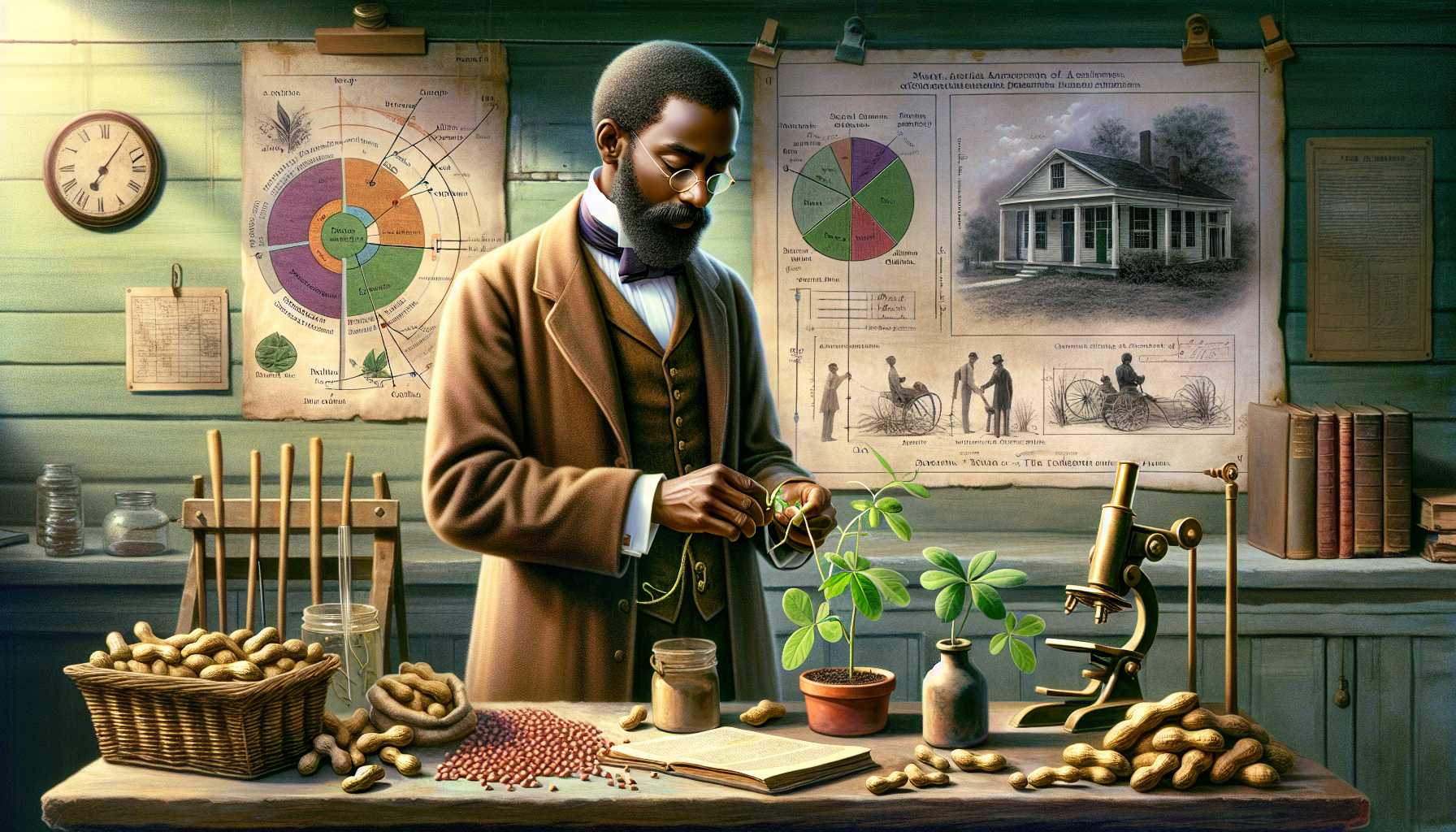
George Washington Carver: Pioneering African American Scientist and Innovator
George Washington Carver was an influential African American scientist and inventor, born around 1864 into slavery in Missouri.
Jōji Washinton Kābā wa, 1864-nen goro ni Mizūrī-shū de dorei to shite umareta eikyō-ryoku no aru Afurika-kei Americajin kagakusha de ari hatsumeika deshita.
ジョージ・ワシントン・カーバーは、1864年ごろにミズーリ州で奴隷として生まれた影響力のあるアフリカ系アメリカ人科学者であり発明家でした。
He faced numerous challenges, including discrimination, but ultimately pursued an education, earning a bachelor's and master's degree in agricultural science from Iowa State Agricultural College.
Kare wa sabetsu o fukumu ōku no kadai ni chokumen shimashita ga, saishū-teki ni wa kyōiku o tsuikyū shi, Aiowa-shū nōgyō daigaku kara nōgyō kagaku no gakushi-gō to shūshi-gō o shutoku shimashita.
彼は差別を含む多くの課題に直面しましたが、最終的には教育を追求し、アイオワ州農業大学から農業科学の学士号と修士号を取得しました。
Carver became renowned for his innovative agricultural techniques, promoting crop rotation and alternative crops to cotton, such as peanuts, sweet potatoes, and soybeans, helping to restore nitrogen to the soil depleted by cotton farming.
Kābā wa kakushinteki na nōgyō gijutsu de yūmei ni nari, mikan no kawari ni rakkasei, satsumaimo, daizu nado no sakumotsu no wansaku o sokushin shi, mikan nōgyō ni yotte koshaku shita doji ni chisso o kaifuku sasenakatta.
カーバーは革新的な農業技術で有名になり、綿花の代わりに落花生、サツマイモ、大豆などの作物の輪作を促進し、綿花農業によって枯渇した土壌に窒素を回復させました。
Carver's work not only transformed farming practices in the South but also played a significant role in improving the lives of poor farmers.
Kābā no shigoto wa nanbu no nōgyō kankō o henkaku shita dake de naku, mazushii nōmin no seikatsu o kaizen suru ue de jūyō na yakuwari o hatashimashita.
カーバーの仕事は南部の農業慣行を変革しただけでなく、貧しい農民の生活を改善する上で重要な役割を果たしました。
He advocated for sustainable agriculture that emphasized the importance of soil health and crop diversity.
Kare wa dojou no kenkō to sakumotsu no tayō-sei no jūyō-sei o kyōchō suru jizoku kanō na nōgyō o teishō shimashita.
彼は土壌の健康と作物の多様性の重要性を強調する持続可能な農業を提唱しました。
His research led to numerous inventions and product formulations derived from peanuts and other crops, contributing to economic development in agriculture.
Kare no kenkyū wa rakkasei ya hoka no sakumotsu kara hasei shita ōku no hatsumei ya seihin no shohō ni tsunagari, nōgyō no keizai hatten ni kōken shimashita.
彼の研究は落花生や他の作物から派生した多くの発明や製品の処方に繋がり、農業の経済発展に貢献しました。
Beyond his scientific achievements, Carver was noted for his humble demeanor and commitment to education.
Kagakuteki gyōseki o koete, Kābā wa kenkyo na taido to kyōiku e no komittomento de shirarete imashita.
科学的業績を超えて、カーバーは謙虚な態度と教育へのコミットメントで知られていました。
He worked at the Tuskegee Institute, where he educated students and farmers alike.
Kare wa Tasukīgī Kōka Daigaku de hataraki, gakusei to nōmin no ryōhō o kyōiku shimashita.
彼はタスキーギー工科大学で働き、学生と農民の両方を教育しました。
His legacy continues to influence sustainable agriculture, and he is celebrated as a pioneer who advanced agricultural science and supported rural development for African Americans.
Kare no isan wa jizoku kanō na nōgyō ni eikyō o ataete tsuzuke, nōgyō kagaku o shinten sasenai, Afurika-kei Americajin no nōson kaizen o shien shita kaitakusha to shite tataerarete imasu.
彼の遺産は持続可能な農業に影響を与え続け、農業科学を進展させ、アフリカ系アメリカ人の農村開発を支援した開拓者として讃えられています。
Based on this article
